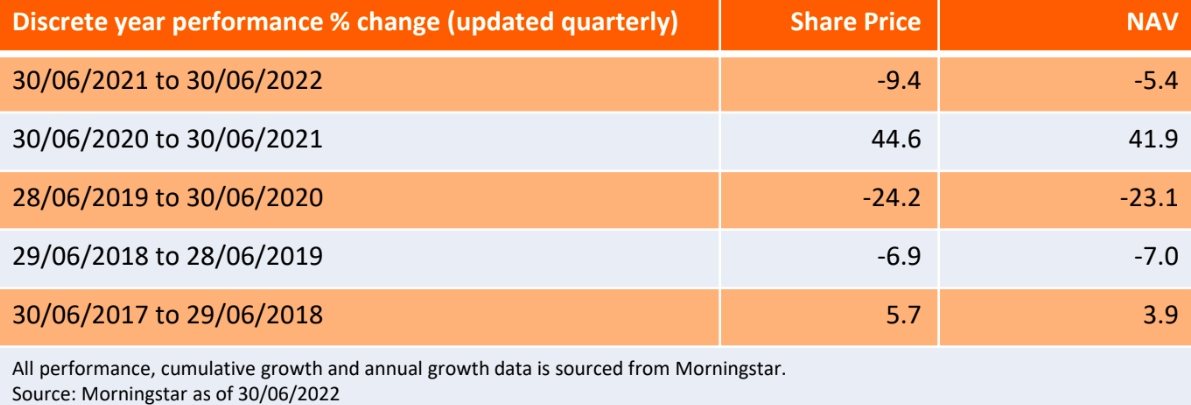
Macro backdrop
After a rebound for UK equity markets in July, August was a more challenging month as the FTSE All-Share Index fell -1.7%. Small and medium-sized companies underperformed significantly, with the FTSE 250 Index falling 5.2% and the micro-cap FTSE AIM All-Share Index falling 4.2% (all figures are in sterling terms on a total return basis). Generally speaking, smaller companies have more exposure to the domestic economy and, in our view, the primary reason for their underperformance is the perceived weakening in the UK economy, with inflation reaching 10.1% in July being an example. This domestic weakness was also visible in the value of sterling which fell notably relative to the US dollar and the euro.¹
Fund performance and activity
During August, the Trust underperformed, falling 2.7% relative to a 1.7% fall in its FTSE All-Share Index benchmark.¹
The portfolio holds a larger position in small and medium-sized companies than its benchmark and this has been a material detractor from performance this month and the year so far. At the sector level, a number of the industrial positions held in the Trust, such as Morgan Advanced Materials and TT Electronics, also performed poorly due to concerns that a broader economic slowdown couldimpact their future earnings.
We bought one new position during the month in building materials company Marshalls, which makes paving stones for commercial and residential use among other things. The share price of Marshalls has fallen substantially this year, leaving the shares on a lower than historic average valuation due to concerns that households will spend less on repair and maintenance spend for their homes at a time when disposable incomes are under pressure. While these concerns are legitimate, Marshalls also has material exposure to commercial spend on infrastructure which, in our view, could prove more resilient. Elsewhere, we also added to the existing positions in Johnson Service Group and Haleon following some recent share price weakness.
Outlook/strategy
During August, we held several company meetings. What we are hearing continues to be largely at odds with the current market sentiment, which is one of heavy caution. While there is a clear slowdown in areas of consumer discretionary -for example, we have seen earnings downgrades from sofa retailer DFS and auto parts/cycling retailer Halfords -the industrial companies that we are meeting continue to report that they are seeing no change in demand levels.
The market’s current view is that this is, in effect, the ‘calm before the storm’ in areas that are yet to see earnings weakness. Good earnings results from companies are therefore treated with heavy scepticism and share prices are rarely reacting to good news. It continues to be our view as we look ahead that while there are likely to be areas of further earnings downgrades, there are also areas that have structural growth drivers -for example, industrial components used in sectors such as health care or renewable energy -where demand could prove more resilient than expected.
Currently, almost all companies with cyclical exposure are seeing their share prices fall (in many cases materially). If, as we move into the second half of the year and beyond, earnings prove more resilient to an economic slowdown than expected, then there could be a reassessment in the market about the valuations attributed to these businesses. For this reason, we have maintained the portfolio’s current overweight position in the industrials sector.
¹Source: Bloomberg as at 31 August 2022
Cyclical stocks – Companies that sell discretionary consumer items, such as cars, or industries highly sensitive to changes in the economy, such as miners. The prices of equities and bonds issued by cyclical companies tend to be strongly affected by ups and downs in the overall economy, when compared to non-cyclical companies.
Dividend yield – The dividend yield, expressed as a percentage, is a financial ratio (dividend/price) that shows how much a company pays out in dividends each year relative to its stock price.
Inflation – The rate at which the prices of goods and services are rising in an economy. The CPI and RPI are two common measures.
Valuation metrics – Metrics used to gauge a company’s performance, financial health, and expectations for future earnings eg, price to earnings (P/E) ratio and return on equity (ROE).
Valuation metrics – Metrics used to gauge a company’s performance, financial health, and expectations for future earnings eg, price to earnings (P/E) ratio and return on equity (ROE).
NAV – The total value of a fund’s assets less its liabilities.
